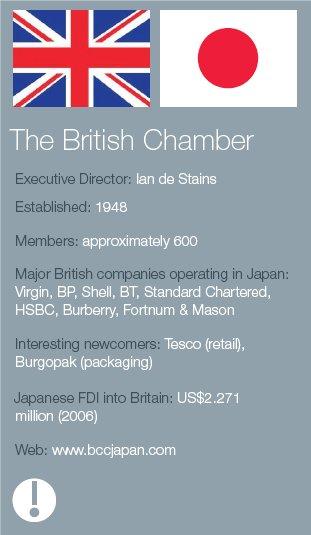Exclusive Interview: Ian de Stains
Ian de Stains
OBE DipArb F.C.I.Arb
By Peter Harris
J@pan Inc talks to the Executive Director of the British Chamber of Commerce in Japan.
 Ian de Stains: Executive Director of the British Chamber of Commerce in Japan. -- Photo courtesy of the BCCJ
Ian de Stains: Executive Director of the British Chamber of Commerce in Japan. -- Photo courtesy of the BCCJ
How do Anglo-Japanese trade relations stand at present? The trade and investment flows are very strong. A little under 50% of Japan’s investment into Europe goes into Britain. This has been the case throughout the latter part of the last century but the nature of that investment has changed. It is less related to manufacturing and has shifted more towards sophisticated R&D facilities— for example, Nissan has its European design headquarters in London. The other way round, Japan is a very significant export market for the UK, beyond Burberry raincoats and Scotch whiskey. In fact, two thirds of British exports to Japan are industrial, and a large part of that is specialty chemicals. Interestingly, the second largest segment is the automotive sector, in particular, parts manufactured by workers who received their training from companies such as Nissan and Toyota as a result of their UK investments— it’s come full circle. Equally surprising, a lot of Japan’s famous computer games such as Tomb Raider and Donkey Kong were written by British programmers. We are also big in financial and corporate services here and of course, Burberry raincoats and Scotch whiskey are important too.
Aren’t British companies more interested in other markets such as China now? The media always like something new and emerging markets and cities like Shanghai are very exciting. However, companies that have done their homework won’t overlook Japan in favor of China—the market there is still critical and in terms of political risk it just doesn’t compare. In China, there is sometimes a lack of transparency when it comes to the law and massive disparity of wealth that could provoke social unrest. Anecdotal evidence suggests that if a foreign company is successful in an arbitration in China against a local entity, they have a less than 50% chance of the verdict being enforced in the courts. Furthermore, there must be questions asked about whether China has the fiscal and management skills to handle a situation such as a financial crisis.
How big is the chamber and who does it represent? We have just short of 300 members but some of those are companies that have a number of active individuals so we actually have around 600 individuals who are chamber members.
How long has the chamber been in Japan and how has it changed? This year is our 60th anniversary. The basic mission of the BCCJ has always been to promote Anglo-Japanese business relations. However, in terms of what it provides for its members, it has changed significantly. When I was first a member over 20 years ago I was vocal in questioning what the chamber actually provided especially to the smaller and individual members; its social functions were limited to being a relatively elitist luncheon club. I complained so much that eventually the chamber challenged me to put my money where my mouth was and I was appointed in 1987 to the directorship. Since that time, with the help of some excellent staff such as Ms Samata, who is still here, we have increased the number of services that we provide enormously.
What services does the chamber perform for its members? Unlike some chambers, we are not funded by any national chamber of commerce or institution based in the UK so we can’t offer any formal consulting or market entry services. However, we are always willing to give advice and we can make appropriate introductions. There is also the British industry center in Yokohama that can offer subsidized office space for British companies. Our main function is to cater to the needs of the members and this means providing opportunities for networking and useful information. For example, we send out a daily round up of Japanese media highlights and have regular events. Most political lobbying we are engaged in goes through the European Business Council (EBC) although we have sometimes raised an issue for specific corporate members, such as in the case of a visa complication.

Can you tell us about the British business awards? The awards took place this April at the Conrad Hotel in the form of a gala dinner with a special menu created by Gordon Ramsay. In putting on this event we wanted to celebrate our 60th year in Japan; 60 is an important age in Japan and we wanted to do something special, partly to thank the members for their support over the years. We also wanted to raise the profile of the chamber and recognize achievements under the categories we created.
Can you tell us something of your own experience in Japan? I came here in 1976 with the BBC to work with NHK. I found so much here that appealed to me that I wanted to stay—I set up my own corporate communications consultancy with a Japanese partner for a time before being asked to come on board at the chamber in 1987. I had a lot of ideas about how things could be improved and did things such as creating a logo, building a revised programme of events and making the chamber more accessible. I was fortunate to have a strong team and have never looked back.
What are you most proud of in your time at the BCCJ? That I had the best staff and a supportive executive body so that we could build the chamber up into a serious and professional organization and make it personable—our goal at the end of the day is to have the members say they are pleased with what they receive from their membership and go away from events with a wholly positive experience, more than just a good meal or an informative talk. I think that with the support of the committees and staff we can now deliver a very positive experience for members and that they feel welcomed and involved.





